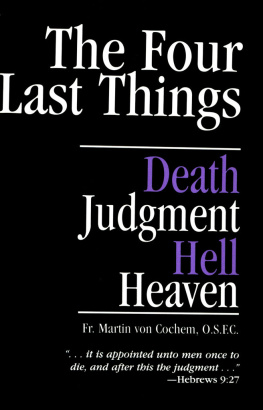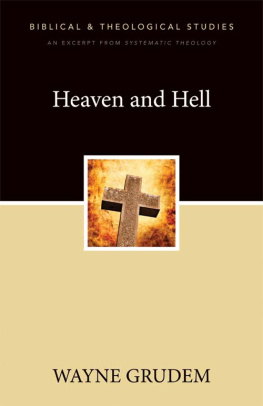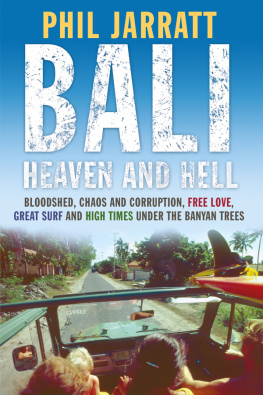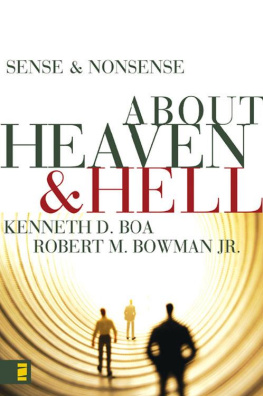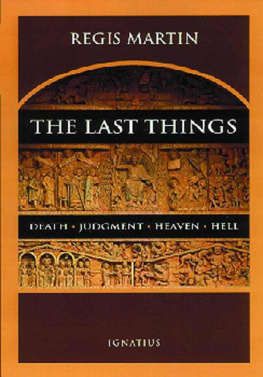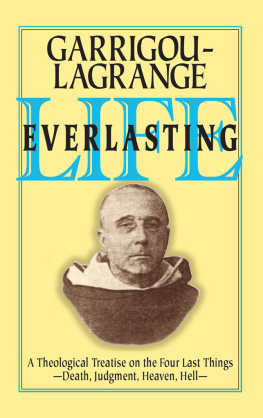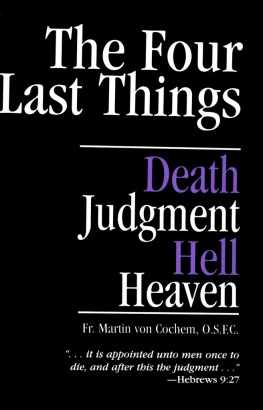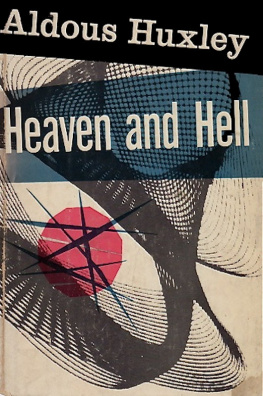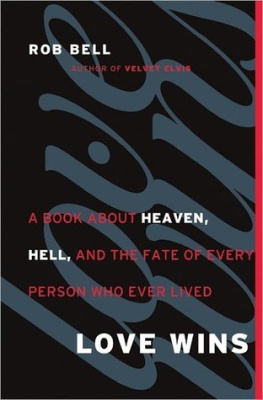Rev. Fr. Martin Von Cochem - The Four Last Things: Death, Judgment, Hell, Heaven
Here you can read online Rev. Fr. Martin Von Cochem - The Four Last Things: Death, Judgment, Hell, Heaven full text of the book (entire story) in english for free. Download pdf and epub, get meaning, cover and reviews about this ebook. year: 2015, publisher: TAN Books, genre: Science. Description of the work, (preface) as well as reviews are available. Best literature library LitArk.com created for fans of good reading and offers a wide selection of genres:
Romance novel
Science fiction
Adventure
Detective
Science
History
Home and family
Prose
Art
Politics
Computer
Non-fiction
Religion
Business
Children
Humor
Choose a favorite category and find really read worthwhile books. Enjoy immersion in the world of imagination, feel the emotions of the characters or learn something new for yourself, make an fascinating discovery.
- Book:The Four Last Things: Death, Judgment, Hell, Heaven
- Author:
- Publisher:TAN Books
- Genre:
- Year:2015
- Rating:3 / 5
- Favourites:Add to favourites
- Your mark:
- 60
- 1
- 2
- 3
- 4
- 5
The Four Last Things: Death, Judgment, Hell, Heaven: summary, description and annotation
We offer to read an annotation, description, summary or preface (depends on what the author of the book "The Four Last Things: Death, Judgment, Hell, Heaven" wrote himself). If you haven't found the necessary information about the book — write in the comments, we will try to find it.
The Four Last Things: Death, Judgment, Hell, Heaven — read online for free the complete book (whole text) full work
Below is the text of the book, divided by pages. System saving the place of the last page read, allows you to conveniently read the book "The Four Last Things: Death, Judgment, Hell, Heaven" online for free, without having to search again every time where you left off. Put a bookmark, and you can go to the page where you finished reading at any time.
Font size:
Interval:
Bookmark:
The Four Last Things
DeathJudgmentHellHeaven
Father Martin von Cochem, O.S.F.C .
Nihil Obstat: | Thomas L. Kinkead | |
| Imprimatur: |  | Michael Augustine Archbishop of New York New York, October 5, 1899 |
Copyright 1899 by Benziger Brothers, New York.
First published by Benziger Brothers, 1900.
The typesetting of this book is the property of TAN Books and may not be reproduced, in whole or in part, without written permission of the Publisher.
Library of Congress Catalog Card No.: 87-50946
TAN Books
Charlotte, NC
www.TANBooks.com
1987
OTHER BOOKS
BY FATHER VON COCHEM
Explanation of the Holy Sacrifice of the Mass
Illustrated Life of Christ
PUBLISHER'S PREFACE.

The Catholic Church has always admonished her spiritual children to reflect often, even daily, on "the four last things": Death, Judgment, Heaven and Hell. For there is nothing better conceived than this powerful meditation to bring forcefully before our minds the essential purpose of life, namely, to save our souls and avoid Hell. The saints have recommended it most highly, especially the great Doctor of the Church, St. Alphonsus Liguori.
The present little book by Fr. Martin von Cochem is a reflection on many aspects of this famous meditation, and it is construed thereby to help us with our own meditations when we approach the subject. No one could be expected to dwell upon every aspect of this book every day, but rather any one aspect of the whole subject is meat enough for a profound daily reflection on our final end. The present book is an excellent tool to assist us in making this exercise regularly.
The reader should realize that Father von Cochem is emphasizing in this little book God's justice , rather than His mercy. Today, one hears almost exclusively of God's great mercy and of His love for mankind. These qualities of our Creator are indeed true, nor, in a sense, is the emphasis on His mercy overdone, for we can never comprehend the great mercy of God nor His infinite love for man that causes Him to extend Himself continually in so many ways (for the most part, of course, only to be rejected by the majority of souls). On the other hand , the complimentary quality of God, His infinite justice, is just as great a reality, and if we would save our souls, we all must satisfy it by repenting of and avoiding mortal sin; and if we wish to avoid Purgatory, by repenting of all sin and making amends for our unexpiated wrong-doing. What the reader should bear in mind while reading The Four Last Things is that the author has purposely concerned himself mainly with God's justice , rather than with His mercy. Obviously, the author is cognizant of God's mercy, but that is simply not the subject of this book.
However, as a result of this emphasis, the reader should not thereby adopt a lopsided view of the task we have of saving our souls, thinking it to be impossible. Just as on the side of divine justice there are many sobering aspects to take into account, not least of which are our own weakness and perversity; nevertheless, on the side of God's mercy, there are equal, if not in fact overwhelming, factors that give us hope of our salvation. In the 20th century alone, Our Lord has appeared to numerous mystic souls, giving messages of His infinite mercy and loveif sinners will only repent and turn to Him. Some of these privileged souls are Sr. Josefa Menendez (d. 1923), Sr. Faustina Kowalska (d. 1938), Sr. Mary of the Trinity (d. 1942), and Sr. Consolata Betrone (d. 1946). But there have been others as well. Further, the Catholic Church possesses the sublime Sacrament of Confession, whereby sinners may unburden their hearts and gain forgiveness of their sins; and she also grants indulgences. Especially worthy of note are plenary indulgences, whereby a person can make expiation for all the temporal punishment due to all his sins in just one actone plenary indulgence. Indeed, Almighty God has been merciful to an incredible degree to us poor miserable sinners.
The Four Last Things , besides focusing our attention on the principal reason we exist and our principal job in this world, is also excellent for the many somewhat "lesser-known" truths of our holy religion that it enunciates, for example, that at the hour of death the devils intensify their efforts to cause a soul to be damned. For it is then that the person is weakestphysically, mentally, emotionally and even, one might say, spiritually, because he or she could easily be in a state of confusion due to concern about unforgiven or unexpiated sins. During the healthy, mature years of our lives, therefore, it behooves us to contemplate our death and our final end, and to prepare for a happy and holy death in every way possible, realizing that at the hour of death Satan will mount his most powerful attacks and we will be in the greatest danger of losing our souls.
The author says that death is a time of confusion for all, which in one sense is very true, for did not even Our Divine Lord cry out just before expiring, "Father, into thy hands I commend my spirit." ( Luke 23:46). Death is not natural for us, and it is something we all wish to avoid. But if we rely on the help of Our Lady, surely our death will be as peaceful as possibleand many good people achieve a peaceful, holy deathyet many of the great canonized saints were terribly concerned for their eternal salvation even on their death bedsa very sobering thought.
Another little-known and almost never-mentioned truth of our religion that the author brings out is the fact that we do not know for sure if we are truly pleasing to God, i.e., whether we are actually in the state of grace and free from mortal sin, or whether we are in the state of mortal sin and worthy of Hell. And he cites Scripture to reinforce this point. Many today think that most people are in the state of grace and destined for Heaven; whereas, the catechism teaches that most adults commit mortal sins. This realization alone, that we do not know for sure if we are pleasing to God, should make everyone humble, if nothing else will.
The author also touches upon the topic of whether most people are saved or damned. The predominating opinion among the great writers of the Church is that most souls are lost eternally because they do not cooperate with the graces that God makes available to men to save their souls. And they cite several indicative passages of Scripture to this effect, especially the famous passage in Matthew (Chapter 7, verses 13 & 14): "Enter ye in at the narrow gate: for wide is the gate, and broad is the way that leadeth to destruction, and many there are who go in thereat. How narrow is the gate, and strait is the way that leadeth to life: and few there are that find it!" Also, in Matthew 20:16, Our Divine Saviour boldly proclaims in the following manner: "So shall the last be first, and the first last. For many are called, but few are chosen." And there are many other passages in Scripture to indicate this same meaning.
There are also several minor aspects of Fr. von Cochem's book that need explanation as well: For example, he speaks about God being "angry" with us because of our sins; in fact, the Bible in many passages speaks of "the wrath of God." However, we know from reason and we are taught by philosophy and theology that God is perfect, and as such is perfectly serene , or impassible, that is, He does not become angry as we understand it or undergo any suffering or change. Speaking as if He does is simply an anthropomorphism to express His justice with us, which takes the form of some sort of punishment sent our way. It is an allegorical manner of speaking and should always be taken as such. There are sophomoric minds who would dispense themselves from taking seriously such a sober study as this book simply because of their own puerile interpretation of such language. Those who would judge thusly do so only to the detriment of their own souls.
Next pageFont size:
Interval:
Bookmark:
Similar books «The Four Last Things: Death, Judgment, Hell, Heaven»
Look at similar books to The Four Last Things: Death, Judgment, Hell, Heaven. We have selected literature similar in name and meaning in the hope of providing readers with more options to find new, interesting, not yet read works.
Discussion, reviews of the book The Four Last Things: Death, Judgment, Hell, Heaven and just readers' own opinions. Leave your comments, write what you think about the work, its meaning or the main characters. Specify what exactly you liked and what you didn't like, and why you think so.

